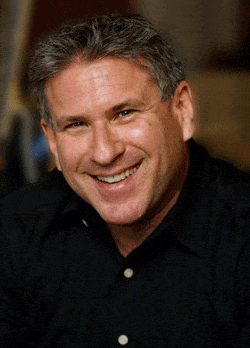
Steve Farber is the president of Extreme Leadership, Inc. and the author of four books, including Wall Street Journal bestseller Greater Than Yourself, and his first book, The Radical Leap: A Personal Lesson in Extreme Leadership, which was named as one of the 100 Best Business Books of All Time.
I’m so excited to have with us today, Steve Farber. He is such a delightful person. He’s an Inc.com columnist. He’s got three amazing books out there. Radical Leap for sure came about at a time when I needed a bit of a wake-up call. The second book, Radical Edge, and then the third, Greater than Yourself, all work around this concept of leadership and who we are in the world and how to take those to higher and higher levels. Through the organization that he operates, Extreme Leadership, he’s changing the world. As you know, we love to track those kinds of people over here at Super Power Experts. Welcome, Steve.
Thank you, Tonya. I’m happy to be here.
Let’s jump right in and talk about what are your superpowers?

Love is Good Business: My bias is to like people. It shows up as a superpower because people really perceive that in me
I think there are two in particular. One is I have an ability to take complex ideas and make them really simple and accessible to people, which reflected in my book. I think it’s one of the things that people appreciate about my message around Extreme Leadership.
The other is people tend to like me. The reason is that, I think this really my superpower, just the outcome of it, is that I really like people. My bias is to like people. I think it shows up as a superpower because people really perceive that in me, because it’s real and it’s genuine. Those are the two main things that have served me well.
Part of the tasking that I undertook when we started taking on the whole Superpower brand is if we’re telling people that superpowers are real, then we probably should start saying what they are, describing them, how people use them and everything else. I’ve been compiling a ton of information over the last year and half and so, on what are people really doing? Not just the like the demonstrable ones that make people feel pretty cool, but how do they use them in the world? I love that you tied those things together because I’m starting to see these traits that people have, like people liking you, there is this real charisma piece. I’ve done assessments after assessments after assessments on people, those who have it, in my opinion, have it for a very specific reason.
You outlined that reason beautifully, where there is this kind of attraction principle that allows us to do our work in the world in terms of touching lives and affecting lives and creating change. Some people really do connect in that space, as well as the synthesis piece. That information synthesis superpower, that in and of itself is also a gift. I don’t know if you’ve had this experience, but I think it’s typical for those of us who like to develop processes and deliver information. Once you start constructing things, all the data falls into place to say, “That fits here and that fits here.” I like that you’re talking about a couple of the more obscure superpowers, if you will, but they’re pretty key to the type of work that you do.
Yeah, they are. Now that I think about it, they’re actually related in this way. I guess you can say I’m a professional communicator through speaking and writing, everything in my business revolves around that. When I’m communicating with somebody, my main concern is I want them to really get it. I want them to really get it because I love people. I said like before, the truth is love is probably more accurate, particularly as I get to know people better. If I love you, I really want you to understand. I really want you to get the benefit of it. Whatever it is. As opposed to communicating because I want to look smart or communicating because I want to show how experienced I am or accomplished. You can tell when somebody has that agenda behind whatever it is they’re saying you’re doing, it’s all about them. The two things are tied in together.
As far as the liking/loving people and therefore people reciprocate with that, there is another superpower that’s related to it I would think. I wouldn’t call it a superpower but it looks that way, and that is people are able to get people to like them but the feeling is not mutual. There is this thing as charisma that’s not based on authenticity. The so-called charisma that’s based on being able put on a good show and just learning how to push the right buttons for people to respond in a certain way. I think what’s happening internally is really important in all of us.
You’re absolutely speaking my language. When I set out on this trajectory, if you will, I was like, “Let’s just teach people how to use their superpowers.” A lot of that is really tied up into this idea of collaboration, because my bias is that you really don’t get solid, consistent, reliable use of your superpowers until you’ve committed to use them for good. My bias again is that that’s for the collective. It’s not for personal gain. Although, of course, we’re very self-serving people, it makes us feel good to do it.
The biggest shock to me was to find out that a lot of people weren’t really ready to collaborate, and it’s for exactly what you’re talking about. I had to do a lot of searching and be, “What is going on here?” I figured that you build a system, they will come. If you build a system that promotes collaboration, then people will collaborate, it’s pretty simple. Then, I finally just broke up the journey into two parts, and that was the other reason why I was so excited to connect with you, because even as I was reading your book I’m like, “I’m very clear on where you are in that part of the journey.” As people are walking up their mountain, they’re summoning their own mountain, that’s that personal power journey, the hero’s journey. They’re doing it to figure out who they are. We want to find our mission, our purpose.
It’s establishing that internal self-confidence. I talk about sovereignty and our own authority. The people who truly are in a position like you’re talking about to use charisma and those attraction principles and all the stuff to do really good things in the world through that reciprocating energy and synergy have gotten to the top their mountain. They’ve already started walking down on the other side to do their work in the world. That’s the frame work that I’ve put around it because I couldn’t figure out why certain people could come into groups and to assist people from a certain perspective and others didn’t. That seems to be the delineating factor. They just have a pretty clear understanding of who they are. They’ve done some journeying. They’ve done some things in the world. They’re no longer seeking to define themselves through their accomplishments. They’re able to that.

Love is Good Business: The way up the mountain is to extend themselves in a loving and collaborative way.
I hear you and I think that’s true. I also think that that presents our great opportunity for people. That’s to get them to understand that the way up the mountain is to extend themselves in a loving and collaborative way. There are people who have accomplished lot of things and now they’ve started to think about their legacy and how they want to help people based on everything that they’ve learned. What I try to teach people in my work is in large part, it doesn’t matter how inexperienced you are, even if you’re a kid in middle school. You’re going to achieve a lot more success by reaching out to others to help them, which is really the theme behind Greater Than Yourself, which is my third book.
The paradox that presents is that, and this is from my experience of working with just about every kind of company that you could imagine over the last 25 years or so, the greatest leaders become the greatest leaders by making others greater than themselves, which is a little bit of a paradox. If you want to be one of the greatest then make sure that other people are greater than you. I think that that’s really critical from a very young age. That’s the way up the mountain. For some people, that’s counterintuitive because they have been trained to believe that the way to succeed is by stepping on other people’s heads, not raising them up.
Whether it’s a child or someone who’s been around for quite a while, it’s still an ability to grasp the essence of who we are outside of those maybe what we’re programmed to believe, what society tells us or whatever, about how to figure out who we are through our accomplishments or checking boxes. Rather, it’s that connection. Ultimately, if you believe in the fact that we’re all seeking that connection to ourselves, to others, that type of thing, it’s being able to remove yourself from the, I’m just going to call materialistic, I’m not sure if that’s a good word for it. But just the more kind of societal standards of success and really get in touch with that essence of ourselves.
I think that that leads us back to what you’re talking about where when you connect with others and really do lift them up in a really genuine way, that feeds that sense of connection and further helps us know clearly who we are in the big essence of that soul concept. When you’re filled with that, there’s no need to go and seek that through superficial means. Let’s talk a little bit about Extreme Leadership. Tell me how all that came about.
First of all, let me define it at least to some degree. Extreme Leadership is my way of saying real leadership. Not leadership by perks of your position or title, but by virtue of your willingness to step up and change the world for the better, or at least your part of the world for the better. This is a point of view that was developed over more than two and a half decades of being out there in the business world and learning from people and as well as teaching. That’s also a reciprocal thing. I started out as a business guy. I am an entrepreneur by nature. I was in the financial services industry. I had my own company before, I was thirty years old. I learned two things. I learned that I really love business but I also learned that I hated the business that I was in. I was very ill suited for the commodities world, which is where I cut my teeth. I took my love for business and working with people and I started to funnel it into doing things like teaching workshops, communication workshops, business workshops, that lead into leadership work and consulting.
It just evolved over the years, starting back in 1989. Over the years, over the decades, I’ve had this incredible exposure to so many people in the business world. Many of whom were incredible leaders and many of whom were, let’s say, not. It’s amazing, you can learn from both. I had some phenomenal mentors, like Tom Peters, who is perhaps the original popular management guru, author of In Search of Excellence. Jim Kouzes, the author of Leadership Challenge. I just had these incredible people, that in my young formative years, I was able to work with and learn from. Over the years, I developed my point of view and found my own voice in how I communicate. What it comes down to, Extreme Leadership, in many ways, what it comes down to is operationalizing, if that’s the right word, love as a business and leadership principle.
That really is the foundation of what I teach and have been teaching for quite some time. Love is just damn good business, that if you want to succeed as an entrepreneur, as a business person, as a human being, the same thing applies. Succeeding as a business person and succeeding as a human being are the same thing. There’s this idea that somehow business is less human, or the normal things that we appreciate as people don’t apply when we go to work, it’s just insanity. It’s about understanding how we take what’s already there, instinctually and naturally for us as people, and bringing that on everything that we do, including work. That’s cultivating love.
I’ve often talked about the Og Mandino book, The Greatest Salesman. That’s been talked about when I was in corporate America. It was a while ago. That’s the greatest book and people were following it. I finally broke it out and read it. I thought it was really fascinating that in all the discussions, I’ve heard of it being used is the sales technique. No one ever talked about what I thought the most crucial point, which was him suggesting that before you sit down and talk with somebody, that you say, “I love you” to that person, at least internally and exude that energy toward them. I was like, “Isn’t it funny that got left out of all the conversations I ever heard.”
The thing is this is nothing new. I take a lot of encouragement from this, because I spend a good deal of my working life speaking at conferences and meetings and all that. I communicate these ideas to hard core business people. I get invited in to speak at, for example, I was in Charlotte, North Carolina last week to speak with 500 managers of a big real estate company. By all outward appearances, these are business people. You go there and talk about love, that’s California touchy-feely, hoo-ha crap. Of course they get it, they’re just not used it. Somebody like myself, who’s a business guy, standing up in front of them and saying, “It’s really about love. Here’s why and here’s the case for it. Here’s the evidence for it. Here’s the example, example, example. Here’s what you should do about it.”

Love is Good Business: We’ve avoided it because we all make this collective assumption that people are going to disregard us if we use that language.
We’ve avoided it because we all make, it’s very weird, this collective assumption that people are going to disregard us if we use that language. But yet when we start talking about it nobody disregards us because of that language. It’s a common myth that we bought into. Og Mandino writing about this. It was there but nobody talks about it because we think we’re not supposed to. What’s so cool is when people are given permission to actually explore it and not just use the word. It’s not just about saying, “I love you, man.” It’s about thinking, what does that look like in the way that we do business? What does that look like in the way that we interact with each other?
That’s where it becomes a business practice. What I find encouraging about all this is that there is less and less resistance over the years to this idea. I used to feel like I had to really make a hard case for it, and I still do. But I don’t feel like it’s as necessary as it used to be. They get it more really, which says to me that we’re evolving as human beings, as business people. Whereas fifteen years ago, if you started talking about meaning and discovering your why, it was very squishy. Now, everybody is doing it.
I think it goes back to what you’re talking about, the idea of the separation between your work and your personal life. It’s starting to merge together. Awhile back I started calling it a holistic life, where your work is your life, your life is your work and not in unhealthy way. I’ve heard Justin say to people, we’re a 24/7 family. This is how we operate. There is no, “You go to work for eight hours and then you come home and put on something different.” I do see that kind of language in those conversations happening in work places as well as in home life. As those merge more and more together, it stands to reason that we have to start talking about, how are we connected? How do we want to be connected? How do we want to interact with our co-workers?
I like to deal with multi-dimensional concepts and frequencies interventions. I never really know if we have accepted that into our own existence, therefore we seek it more and are welcoming more of it, or if truly the world is changing. I don’t know that we can never have an unbiased perspective of that. But I choose to believe that the world is changing and that we do see more of that as a whole. I also contended there are people who don’t see that still. That’s where those conversations come into play about, what are you capable of seeing, believing is seeing. I choose to believe that that’s happening and therefore I see it a lot more. But either way, the end result is things are much more enjoyable. It works regardless.
We don’t always need to know why. Even if we understand it at a deeper level as to the reasoning behind it or what’s going out of it, it just sometimes makes it easier to apply it.
Do you think that we are truly understanding why or that we’re creating the why?
I don’t know. Like you, it sounds like, I don’t know that I really have to know the answer to that. I am always willing to admit that the reality as I perceive it is that when people allow their hearts into their work and have love and compassion for their customers and their colleagues, that great things can happen. When I say great things, I don’t mean just the great things, like I’m happy here at work, which is really. But great things like increased profitability, greater customer attention, lower staff turnover. All those things happen when we’re doing something that’s just so fundamentally human. Is it because we want it more? Is it because the world changing? Is it because we’re changing it? I guess in the final analysis, I don’t really care as long as it happened.
Let’s tell people a little bit about how you work. I know you’ve mentioned you go into corporations and businesses and stuff, do you work one-on-one with folks?
I do. There are a couple of things that we do that anybody can participate in. First of all, we run the Extreme Leadership Workshop here in San Diego. A couple of times a year we do a public forum. Most of my work, traditionally, is I get hired to come and speak to companies, which means that a lot of people can’t participate unless they happen to work for that company or go to that association meeting. When we started doing these public workshops in San Diego. We do a one day Extreme Leadership Workshop that goes deep into the lead framework, which is love, energy, audacity and proof. That’s outlined in the book. For those that want to take it deeper, we offer a certification program that continues for the next three days. For people that wanted to become licensed and certified, actually learn workshop and teach it and however they want to do it in their own business, start a business around it, integrate it into their lives, however they choose. They stay for the full four days here in San Diego. We finish it all up with a barbeque at my house, which is why we do this thing to begin with. It’s all about the barbeque.
Then working one-on-one with folks, I do that as well as a mentor, but it’s not something that I honestly market, nothing on my website that suggests it. I just take it on a case-by-case basis for people who want to do that. We are in the process of expanding our business and making these ideas and these programs and these products available to people on an online basis. We’re just about to launch an eCourse called the Extreme Leadership Edge, which turned out great. We’re just ironing out the last few technological things and then we’ll be launching that as well. That will be available on the website at SteveFarber.com soon.
Is there anywhere else you would like to send them if they want to find out more about you?
SteveFarber.com is the place to go. If you can’t remember my name and you can only remember Extreme Leadership, that will take you to the same place, ExtremeLeadership.com.
I’m really excited to see what you create next in the world. I appreciate knowing that you’re out there making some waves and shifting things. It makes me excited to be a human being beside you these days.
Thank you. It’s very kind of you to say. I do the best I can to live up to what I teach.
Thank you for joining us today. To all of you out there, as always, we appreciate your loyalty. Until next time, go out, uncover your superpowers and change the world. Take care.
Podcast: Play in new window

